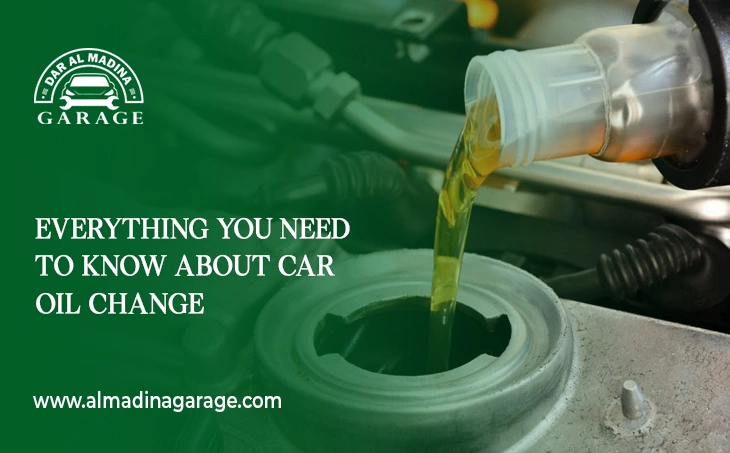Everything You Need to Know About Car Oil Change

Your car needs oil because it shields the engine, keeps it from wearing down, boosts power, and uses less gasoline. Frequent car oil changes maintain the efficiency and smooth operation of your engine. Do you know how frequently you should replace your oil? This is our in-depth guide to all the information you require to change your automobile’s oil and oil filter!
Car Engine Oil: What Is It?
A car engine oil lubricant is used in internal combustion engines to lessen friction and component wear. It comprises a blend of base oils plus performance—and durability-enhancing additives. Knowing when to replace your engine oil is vital since it plays a significant role in maintaining your vehicle’s smooth operation.
An Oil Filter: What Is It?
An oil filter is a part that keeps engine oil clean and clear of particles, debris, and dirt that could harm the engine by removing impurities from it. It is advised to replace the car oil filter each time you change the oil in your car.
An Oil Change: What Is It?
Now that you know engine oil and oil filters, let’s explore what goes into a car oil change! During an oil change, the engine’s old motor oil is drained and replaced with fresh, clean oil. This procedure lubricates engine parts and lowers friction, keeping your engine operating smoothly and efficiently. Moreover, it cleans the engine of impurities and filth that, if ignored, could harm it. Frequent oil changes help prolong your engine’s life, making them essential for car maintenance.
Can You Analyse the Benefits of Changing Car Oil?
Changing the oil in your car has several advantages, including extending its lifespan and keeping it operating smoothly. Frequent oil changes maintain your engine’s cleanliness, lubrication, and optimal operation. Furthermore, oil changes can lower pollutants, increase fuel economy, and avoid expensive repairs from engine damage. Frequent oil changes prolong the life of your vehicle, improve its performance, and ultimately save you money by averting failures.
For the following reasons, engine oil plays a broad and crucial role:
- Lubricates engine components to reduce friction between metals.
- Keeps engine components from rusting.
- Guarantees appropriate engine compression.
- Contaminants are deposited in the oil filter after being removed.
- It keeps the engine’s temperature constant and cools it.
What Is the Appropriate Timing to Change the Oil and Filter in My Car?
You must replace the oil and oil filter to keep your car operating at its best. The type of oil you use, the brand and model of your vehicle, and your driving style are some variables that affect how frequently these changes occur.
How Many Miles Do You Need to Go Before Needing A Car Oil Change?
Different mileage intervals may be advised depending on the engine and oil type. For most modern cars, an oil change is typically necessary every 3,000 to 5,000 miles.
Ways To Check the Oil Level in My Engine?
This simple procedure makes it easy to check the engine oil level at home. Turn off the engine after putting your automobile in the park on a level area. Find the oil dipstick, remove it, and clean it with a cloth. To check the oil level, insert the dipstick and pull it out again; the oil level should be between the two designated lines. Checking your oil level before a lengthy drive is a good idea. See your nearby specialist if you need a top car oil change service in Dubai!
What is the Typical Time Frame for An Oil Change?
The duration of an oil change varies depending on the type of vehicle and the quantity of oil changed, but it usually lasts 15 to 60 minutes. The procedure entails emptying the old oil, adding fresh oil, and changing the filter.
What is the Appropriate Oil to Use in My Car?
Your automobile’s brand, model, year, and kind of engine will determine which type of oil is best for it. For details on oil grades and standards, refer to the owner’s manual for your vehicle. Your nearby knowledgeable specialist, like Dar AL Madina, can help you choose the right type of oil for your car to avoid engine problems and follow the manufacturer’s instructions.
What Problems Would I Face If I Never Changed the Oil in My Car?
Regular oil changes should not be neglected as there may be dire consequences. Engine wear brought on by tainted oil may require expensive repairs or replacement. Reduced fuel efficiency and power can also be a problem for an engine using old oil. Old oil can get sluggish and thick, blocking the engine and resulting in costly repairs from overheating and seizing up. To avoid these problems, routine oil changes are necessary.
Can A Mot Fail Due to A Low Oil Level?
A Ministry of Transportation (MOT) test is an annual vehicle evaluation to guarantee roadworthiness. Since proper fuel and oil levels are necessary for accurate exhaust emission readings, the MOT tester may decline to conduct the test if the oil level in your car is too low. You can save money and worry by having a pre-MOT exam performed by your local branch to prevent this.





